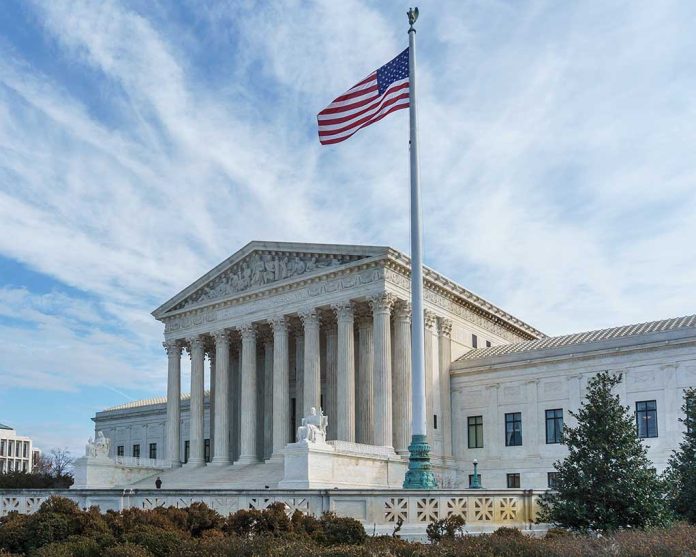
The Supreme Court upheld gag order on Donald Trump, rejecting his bid to lift restrictions in New York criminal case.
At a Glance
- Supreme Court declines to lift gag order on Trump in New York criminal case
- Gag order protects jurors, court staff, and their families from public statements
- Trump faces 34 felony counts related to falsifying business records
- Justice Samuel Alito handled the denial, marking second time justices upheld restrictions
- Trump argues remaining restrictions infringe on his First Amendment rights
Supreme Court Maintains Gag Order on Trump
The Supreme Court has declined to lift a gag order imposed on former President Donald Trump in his New York criminal case. This decision marks a significant development in the ongoing legal proceedings against Trump, who faces 34 felony counts related to falsifying business records. The gag order, initially put in place by Judge Juan Merchan in Manhattan, remains largely intact to protect the trial’s objectivity from external pressures.
Justice Samuel Alito handled the denial, marking the second time this year that the Supreme Court has upheld these restrictions on Trump. The gag order specifically prohibits Trump from making public statements about jurors, court staff, and their families involved in the case. This decision underscores the court’s commitment to ensuring a fair and impartial judicial process, free from potential public bias or intimidation.
The Supreme Court once again declined to the lift Manhattan Judge Juan Merchan's gag order on President-elect Donald Trump over his trial on charges of falsifying business records that resulted in a conviction in May on 34 felony counts. https://t.co/j3zJZM1dVq
— NEWSMAX (@NEWSMAX) December 9, 2024
Trump’s Legal Team Challenges Gag Order
Trump’s legal team has argued that the remaining restrictions infringe on his First Amendment rights. They contend that these limitations unfairly restrict Trump’s ability to speak freely, especially as a presidential candidate. The gag order was initially imposed before Trump’s May conviction on 34 felony counts related to falsifying business records from hush money payments to Stormy Daniels.
While Judge Merchan has partially lifted some aspects of the gag order, he has maintained provisions to protect court personnel and jurors. This decision reflects a delicate balance between preserving the integrity of the legal process and acknowledging the unique position of a former president and current presidential candidate.
Implications for Trump’s Legal Battles
The Supreme Court’s decision to uphold the gag order comes amidst a series of legal challenges facing the former president. Trump’s legal team has requested the dismissal of the conviction, citing comments made by President Joe Biden about his son Hunter Biden’s prosecution. This argument attempts to draw parallels between the two cases and question the fairness of Trump’s prosecution.
Adding to the complexity of the situation, Judge Merchan has delayed Trump’s sentencing while considering arguments on whether Trump is immune from criminal prosecution. This delay raises questions about the status of the conviction if Trump were to return to the Oval Office, especially given that his federal criminal cases have been dismissed.
Future Implications and Ongoing Legal Battles
As the legal proceedings continue, Manhattan District Attorney Alvin Bragg is expected to file a motion to uphold the conviction. Bragg has suggested that sentencing could resume after Trump’s potential term ends in 2029. This timeline highlights the unprecedented nature of the case and its potential long-term implications for both Trump and the American legal system.
Sources:
Supreme Court rejects Trump bid to lift New York trial gag order
Supreme Court Declines to Lift Judge Merchan’s Gag Order on Trump














